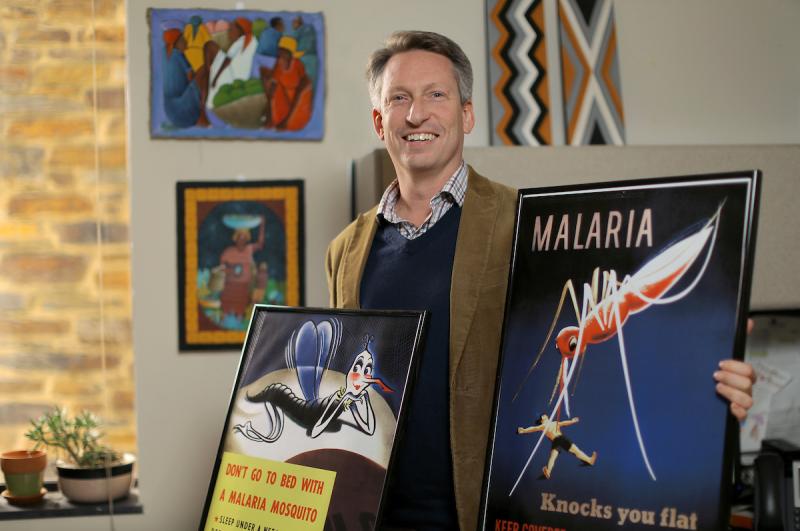
In 2016, the Duke School of Medicine selected 38 of its faculty for the new Duke Health Scholars and Duke Health Fellows Program. With funds from the Duke University Health System, the program supports the research efforts of early to mid-career clinician-scientists at Duke. Among the faculty honored are 14 individuals from the Department of Medicine, including Steve Taylor, MD, MPH, assistant professor of medicine (Infectious Diseases) and assistant research professor of global health.
Malaria was evicted from the United States by 1951. But globally it remains a scourge, killing one young child every two minutes, on average, mostly in sub-Saharan Africa.
How could an infectious disease doctor thousands of miles away in central North Carolina ever hope to wound such a formidable foe?
Steve Taylor has some ideas, very good ideas, which he rarely pursues alone. All are powered by a drive to reduce the death toll from the preventable and treatable insect-borne illness.
“I want to prevent kids from dying.” Taylor says. “The fact that parents are burying their children used to be abstractly bad. Once you have children you realize that is unimaginably bad.”
The founder of the Duke Malaria Collaboratory, Taylor first arrived at Duke as undergraduate from outside Chicago the mid-1990s planning to become an engineer. After finding biology a better fit, he stayed in Durham for medical school, which is where a roommate whose physician mother worked in Haiti introduced him to the field of global medicine.
Trips to Haiti, Thailand, and Cuba during medical studies, along with master’s degree training in public health at nearby University of North Carolina, convinced Taylor he could work internationally too. During residency training at Yale University, he selected infectious diseases as his specialty.
But a clinical rotation in modestly provisioned hospital in Zambia taught him he could likely have greater impact at the laboratory bench than at the bedside. “I decided I could add more value on the research side. You can generate questions and data there,” he said.
Returning Duke as a research fellow, Taylor headed back to UNC to join the lab of Steven Meshnick, MD, PhD, to investigate how to protect pregnant women from malaria and many other very weighty topics. Taylor used falciparum-parasite-infected blood samples collected in malarial regions to also probe the disease’s spatial epidemiology, how the single-cell Plasmodium parasites produces malaria, how parasites can vary genetically, and the rise of drug resistance.
Since joining Duke’s faculty in 2012, Taylor has built on those studies and on an international web of caregivers and researchers he was looped into at UNC. In Durham he also ventures regularly off Duke’s medical campus to collaborate with engineers, biologists and any other expert able to contribute.
“One striking thing about Steve's portfolio is its breadth. It includes mechanistic studies of parasite biology, epidemiologic studies of parasite transmission, molecular surveillance of parasite genetics, and clinical studies of parasite impact. This man builds collaborations that are critically needed,” said Kenneth Lyles, MD, former director of the Department of Medicine Clinical Research Unit.
New Weapons Against an Ancient Enemy
With the laboratory of Tuan Vo-Dinh, PhD, in Duke’s Pratt School of engineering, Taylor is developing a nanoscale photonic device that can both detect malaria parasite DNA and mutant parasite DNA in blood samples in the field. The instrument could deter overuse of malaria drugs and detect evidence of emerging drug resistance.
With colleagues in England, Malawi and Chapel Hill, Taylor is studying alternatives to current prophylactic treatment intended to prevent malaria in pregnant woman. Back-up treatments are needed in case resistance disarms the best malaria drugs now in circulation, as it has in the past.
Another project is interrogating why, on a cellular scale, people who have sickle cell trait, produced by just one mutated hemoglobin gene, have innate protection against malaria. RNA studies from this research have turned up intriguing differences in RNA transcription that Taylor hopes could target malaria parasite proliferation inside normal blood cells.
At the same time, Taylor and collaborators are looking for the best prophylactic treatment for children with sickle cell anemia, a population who inherit two mutated hemoglobin alleles and are very vulnerable to malaria. He hopes that work could also expand Duke’s capacity to conduct clinical trials, including drug treatment testing prevention strategies, and, maybe one day, vaccines in the places where malaria sickens and kills the most people.
With Wendy O’Meara, PhD, at Duke Global Health Institute, Taylor is assessing transmission rates of different malaria parasite strains from people to mosquitoes. They want to characterize which parasite strains are most likely to support a chain of infection from mosquitoes to people and back again.
Taylor loves the science and its practical potential. He very much relishes recruiting more medical and research talent to steeply reduce malaria’s death toll, too.
“You need the smartest people to work on the hardest problems,” he said.
The series of profiles of our Duke Health Scholars were written by Catherine Clabby, freelance science journalist. Photos are by Ted Richardson.